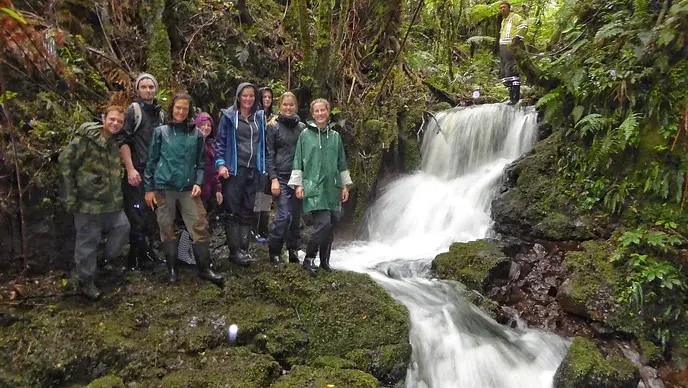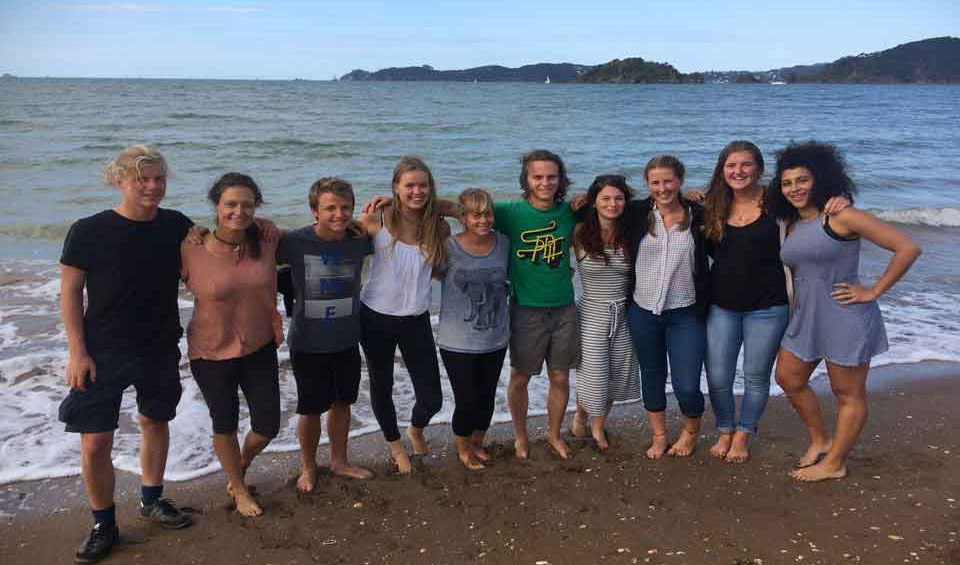Step 1
Step 3
Step 2
You’ll be matched with your personal volunteer travel expert who’ll guide you every step of the way.
Meet Your Travel Expert
Receive your welcome pack with everything you need: arrival info, contacts, visa and insurance help, packing tips, vaccines, language basics, and so much more.
Get Ready to Go!
Choose your dream project and apply for free—no commitment, just excitement!
Pick Your Destination & Apply
Step 2
Step 3
Once your dates are confirmed, pay your program fee—choose to pay in full or in easy installments.
Secure Your Spot
Step 4


Want to volunteer in nature and wildlife conservation in New Zealand? Our Travel Roots program will step you off the beaten path and into the heart of New Zealand’s Kauri Coast, where dense rainforests, rare native wildlife, and ancient trees await your care. This program offers you the opportunity to live off-grid and contribute to genuine, hands-on conservation efforts while immersing yourself in nature.
You'll be volunteering at a private rainforest sanctuary that works closely with New Zealand’s Department of Conservation. Your time here will be spent learning practical skills, engaging in physical forest work, and helping protect the biodiversity of this extraordinary landscape. The experience is equal parts personal journey and meaningful impact.
Living sustainably and simply, you’ll gain a deeper appreciation for the balance between humans and nature, sharing your days with a diverse group of international volunteers. This is a unique opportunity to reconnect with what matters most—while giving back to the land in a truly transformative way.
Key Activities Include:
Cutting and maintaining forest tracks
Monitoring endangered wildlife like kiwi and kokako
Installing and checking traps and bait stations
Planting native trees and removing invasive weeds
Navigating rainforest terrain using professional equipment
Chopping wood and supporting general maintenance around the sanctuary
Helping maintain a herb garden and assist with landscaping
Collecting seeds and contributing to native plant restoration
Participating in data entry and conservation planning
Whether you're seeking a break from fast-paced modern life, passionate about environmental stewardship, or ready to challenge yourself in new ways—this program delivers purpose, perspective, and an unforgettable connection to nature.
By volunteering on our Nature and Wildlife Conservation Program in New Zealand, you will:
•Help restore native rainforest habitats and protect rare species like kiwi and kokako
•Live off-the-grid in a peaceful, eco-conscious forest sanctuary
•Gain hands-on experience in conservation techniques, track cutting, and wildlife monitoring
•Learn essential outdoor skills—from using GPS in dense bush to sustainable living practices
•Discover New Zealand’s ancient Kauri Coast and explore glow worm caves, waterfalls, and starry skies
•Join an international team and connect deeply with nature, your work, and yourselfWhat to Expect: A Day in the Life of a Nature Conservation Volunteer in New Zealand
Every day in the forest brings a new opportunity to learn, grow, and make a difference. Living off-the-grid means slowing down and being present—from morning mist to starlit skies. While each day varies depending on weather, conservation goals, and team needs, here’s a look at what a typical day might include:
7:30 AM – Wake Up in the Wild
Start your day with the sounds of native birds echoing through the forest canopy. Take in the crisp morning air as you prepare for a day of physical, rewarding work.8:00 AM – Breakfast and Morning Briefing
Enjoy a hearty breakfast in the shared cabin kitchen, followed by a daily briefing. You'll discuss safety, tasks, and any special objectives—whether it's kiwi monitoring or setting traps for invasive species.9:00 AM – Conservation Work
Venture into the bush to carry out vital conservation tasks. Depending on the day, you might:
•Cut or maintain forest tracks
•Monitor wildlife activity and check tracking tunnels
•Install or refill bait stations and traps
•Record data for ongoing ecosystem monitoring
•Plant native seedlings or remove invasive species12:30 PM – Lunch Break
Return to the lodge for a well-earned meal. Use the break to rest, reflect, and swap stories with fellow volunteers about your discoveries in the forest.1:30 PM – Sanctuary Support & Practical Projects
Afternoons are often spent maintaining and enhancing the living spaces. You might help with:
•Chopping wood for fires
•Building maintenance (painting, fencing, outdoor bath setup)
•Landscaping and herb gardening
•Creative DIY projects using repurposed materials4:00 PM – Free Time & Nature Connection
Once the work is done, enjoy downtime in the sanctuary. Relax in a hammock, explore hidden trails, or join optional group activities like nature journaling or photography walks.7:00 PM – Dinner & Evening Circle
Gather with your team for a plant-based dinner and community-style evening discussion—reflecting on the day and planning for tomorrow.8:30 PM – Night Safari (Optional)
Venture into the forest with red torches in search of nocturnal creatures. Hear the rustle of leaves, spot the glint of eyes in the dark, and—if you’re lucky—witness the magic of glowworms beside the creek.Days Off
One day per week is reserved for adventure and exploration. You might:
•Swim in a freshwater lake or try stand-up paddleboarding
•Walk along an endless stretch of wild beach
•Climb a local mountain or visit ancient kauri trees, including the legendary 2,000-year-old Tane MahutaEach day blends purposeful work with soul-refreshing connection to the land. It’s about balance—making a meaningful impact while learning to live simply, sustainably, and in tune with nature.
Your Impact as a Volunteer
Volunteering on this conservation program is more than just time spent in the forest—it’s a direct and lasting contribution to the future of New Zealand’s native ecosystems. With every track you clear, every trap you check, and every seedling you plant, you’re helping to restore the delicate balance of an environment under threat.
The work you do supports the protection of four distinct forest areas, each home to rare and endangered species. By installing monitoring stations, collecting data, and helping reduce the impact of invasive species, you’re actively safeguarding biodiversity. You might not always see the kiwi or kokako you’re protecting—but their survival depends on your dedication behind the scenes.
Beyond the fieldwork, your impact ripples further. Living sustainably and off-grid teaches a mindset of resourcefulness, resilience, and ecological awareness. As you return home, you bring those values with you—sharing knowledge, inspiring others, and becoming an advocate for the natural world in your own community.
You’re not just helping nature recover—you’re becoming part of a global network of conscious individuals committed to restoring the planet, one forest at a time.
Your Forest Home in New Zealand
Volunteers stay in a peaceful, off-grid forest lodge surrounded by native bush—a true escape from the distractions of modern life. Simple, sustainable, and immersed in nature, your accommodation allows you to fully experience what it's like to live in harmony with the environment you’re helping protect.
Sleeping Arrangements
You’ll stay in an insulated shared cabin, with each cabin fitted with two bunk beds (four beds total). There are separate cabins for males and females, and one designated cabin for couples. If you have a specific request or need a special accommodation arrangement, it’s best to let the team know in advance so they can do their best to accommodate you.
What’s Provided
•Mattress and basic bedding
•Solar-powered lighting
•Shared bathroom and composting toilet facilities
•Outdoor forest shower (yes, under the trees!)
•Herb garden and wood chopping areaLiving Off-the-Grid
This is an unplugged experience—there’s no Wi-Fi or mobile reception. Instead, your time is spent connecting with nature, your fellow volunteers, and the present moment. The forest becomes your classroom, your retreat, and your reminder of what really matters.
Meals & Shared Spaces
Meals are prepared together using fresh, mostly plant-based ingredients. Volunteers take turns cooking and cleaning in the communal kitchen, often gathering around the shared dining area for relaxed and meaningful conversations. There’s also a cozy cabin space for reading, journaling, or planning the next day’s activities.
Life at the lodge is about simplicity, sustainability, and shared purpose. From chopping wood to lighting the fire for a warm evening shower, every moment is part of the experience—helping you slow down, reconnect, and feel a little more at home in the wild.
History
Tucked into the lush, green slopes of the Tutamoe peaks in northern New Zealand lies a 150-hectare sanctuary of regenerating rainforest—an area of national ecological significance where logging is strictly prohibited. This protected forest is a haven for native wildlife and a place where passionate conservationists have created a hands-on, off-grid experience for volunteers from around the world.
The organisation behind this sanctuary is deeply committed to preserving New Zealand’s rich biodiversity. Volunteers contribute not only to this forest but to three additional ecosystems in the surrounding area, each with their own conservation needs—whether it’s protecting thousand-year-old trees or monitoring endangered species such as the kiwi or the kokako.
Mission & Vision
The mission is to restore and protect native forest ecosystems while creating a space where people can reconnect with nature and themselves. Through immersive, practical conservation work—cutting tracks, monitoring wildlife, planting native species, and maintaining the land—volunteers become part of a living, breathing effort to regenerate the natural world.
Their vision extends beyond the forest floor. By offering in-depth training and involving volunteers in all stages of the conservation process—from planning and preparation to implementation and monitoring—they aim to spark long-term change. This is a place where learning, contribution, and personal transformation happen hand in hand.
Program Fees & What’s Included
Program Fees
Duration Fee (EUR)
2 weeks €757
3 weeks €1,099
4 weeks €1,372
5 weeks €1,714
6 weeks €2,056
8 weeks €2,740
10 weeks €3,424
12 weeks €4,108
Payment Terms
• Program fees are due 30 days before your start date.
• If applying within 30 days of your intended start, full payment is required within 48 hours of confirmation.What’s Included
Your fee covers everything you need for a safe, supported, and meaningful conservation journey:
✅ Accommodation in off-grid forest lodge cabins
✅ All meals—plant-based and shared communally
✅ Full training in conservation tasks, health and safety, and navigation
✅ Hands-on experience in forest restoration, wildlife monitoring, and sustainability projects
✅ Flexible start dates and free date changes
✅ Welcome pack full of necessary and useful info
✅ Access to glow worm treks, kiwi night walks, and local day trips
✅ Expert guidance from experienced forest leaders
✅ Full support before, during, and after your program
✅ 100% Cancellation Money-Back Guarantee
✅ So much moreYour Investment in Nature, Conservation and Yourself
This isn’t just a volunteer program—it’s an investment in your growth, your awareness, and your ability to make a difference. Whether you’re here to develop practical conservation skills, reconnect with nature, or simply step away from the fast pace of modern life, your time here will leave a lasting mark.
Every euro you invest helps fund the protection of ancient forests, supports local education, and keeps this sanctuary thriving for generations to come.
Come and immerse yourself in the breathtaking wilderness of New Zealand! Your program fees help sustain forest restoration, support off-grid living, and ensure your experience is as impactful as it is unforgettable.
Where You'll Be – The Kauri Coast, Northland, New Zealand
Your conservation journey takes place deep in the heart of New Zealand’s legendary Kauri Coast—an area rich in biodiversity, natural beauty, and cultural heritage. Nestled on the forested slopes of the Tutamoe peaks, the sanctuary is set within a 150-hectare protected native rainforest, far from city noise and distractions.
Here, you'll wake to birdsong, work beneath towering tree canopies, and fall asleep under star-drenched skies. The nearest town is Dargaville, around an hour’s drive away, offering occasional access to shops and local services. But for most of your stay, you’ll be surrounded by wild landscapes, misty hills, and the calming rhythm of forest life.
This remote location offers you the chance to truly disconnect from the modern world and reconnect with nature—and yourself.
New Zealand – The Land of Forests, Mountains, and Meaningful Adventure
New Zealand is a land where nature still leads. From glacier-fed rivers to ancient forests, its landscapes are both rugged and serene. The Northland region, where your program is based, is one of the country’s most ecologically important areas—home to endangered birds, giant kauri trees, and a rich tapestry of Māori culture.
The climate here is mild and temperate. Summers (November to March) are warm and ideal for long days outdoors, while winters (June to August) are cooler and quieter—perfect for deeper forest exploration and reflective time around the fire.
Beyond its jaw-dropping beauty, New Zealand is one of the safest and most welcoming countries in the world. Its people are warm, adventurous, and deeply connected to the land. As a volunteer, you won’t just see the landscapes—you’ll live them, learn from them, and leave a positive mark.
Free time Activities
& Tours
%20%C2%A9%20APE%20Malaysia%20Mark%20Louis%20Benedict_JPG.jpg)


Volunteering offers not only meaningful conservation work but also the opportunity to immerse yourself in the serene beauty of New Zealand's native rainforest during your free time. Whether you're seeking relaxation or adventure, the sanctuary and its surroundings provide a variety of activities to enrich your experience.
Evening Leisure
After a day of fulfilling work, unwind by watching the sunset, engaging in friendly games of soccer, or listening to the harmonious dusk bird chorus. These communal activities foster camaraderie among volunteers and provide a peaceful end to the day.
Night Safaris
Embark on guided night walks to observe the nocturnal wonders of the rainforest. Spot elusive kiwi birds, marvel at the glow worms illuminating the forest, and discover the unique behaviors of nighttime creatures.
Forest Exploration
During designated free days, venture into the unexplored parts of the rainforest. Discover hidden waterfalls, ancient trees, and the diverse flora and fauna that make this ecosystem unique.
Sightseeing Excursions
Join organized trips to nearby natural attractions such as the Kai Iwi Lakes or Tane Mahuta, the majestic two-thousand-year-old kauri tree. These excursions offer a broader perspective of New Zealand's rich natural heritage.
Relaxation and Reflection
Take time to relax in the tranquil environment of the sanctuary. Whether it's reading a book by the fire during inclement weather or journaling your experiences, these moments provide personal growth and reflection.
These activities complement your conservation efforts, allowing you to fully appreciate the natural beauty and cultural richness of New Zealand's Northland region.


































%20%20%C2%A9%20APE%20Malaysia%20Mark%20Louis%20Benedict%20_JPG.jpg)
